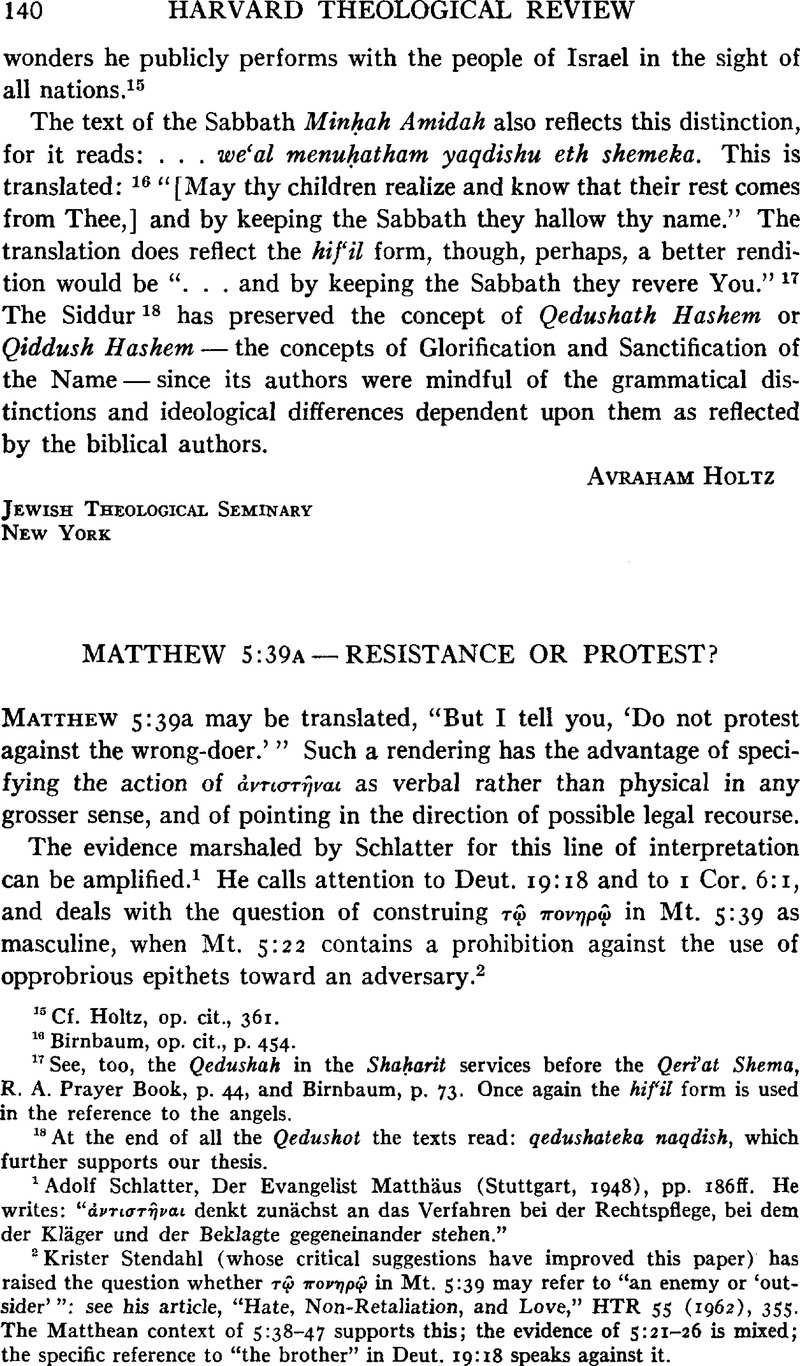Article contents
Matthew 5:39a—Resistance or Protest?
Published online by Cambridge University Press: 23 August 2011
Abstract

- Type
- Notes & Observations
- Information
- Copyright
- Copyright © President and Fellows of Harvard College 1964
References
1 Adolf Schlatter, Der Evangelist Matthäus (Stuttgart, 1948), pp. 186ff. He writes: “ἀντιστῆναι denkt zunächst an das Verfahren bei der Rechtspflege, bei dem der Kläger und der Beklagte gegeneinander stehen.”
2 Krister Stendahl (whose critical suggestions have improved this paper) has raised the question whether τῷ πονηρῷ in Mt. 5:39 may refer to “an enemy or ‘outsider’”: see his article, “Hate, Non-Retaliation, and Love,” HTR 55 (1962), 355. The Matthean context of 5:38–47 supports this; the evidence of 5:21–26 is mixed; the specific reference to “the brother” in Deut. 19:18 speaks against it.
3 For ἀπαιτέω as used of legal recourse, see Moulton and Milligan. For an interesting instance of physical resistance to this sort of commandeering (the same loan word is used in Matthew), see Epictetus, Disc. IV. i. 79: (You ought to regard your body as a donkey, and) ἃν δ᾽ ἀγγαρεὶα ἦ καὶ στρατιώτης ἐπιλάβηται, ἄφες, μὴ ἀντίεινε μηδὲ γόγγυζε.
4 Ernst Lohmeyer, Das Evangelium des Matthäus (Göttingen, 19623), p. 137.
5 Where ‘anah means “testify against,” “gainsay,” or “contradict” other words than ἀνθίστημι are also used in the Greek versions: e.g., ἀντειπεῖν (Gen. 24:50), ἀντικρίνεσθαι (Job 9:32), καταμαρτυρεῖν (Job 15:6; Prov. 25:18), μαρτυρεῖν (Num. 35:30), ψευδομαρτυρεῖν in the Decalogue in Ex. and Deut.
6 The correct form of the original Hebrew is not at stake here, nor the proper interpretation of the phrase. Clearly the Greek translator understood the passage to mean, “Their shameful looks testify against them.” Cf. Vg.: agnitio uultus eorum respondit eis.
7 The masculine τὸν πονηρὸν reappears in Paul; see 1 Cor. 5:13.
8 The counsel on what to say when brought to trial (Mt. 10:19; Lk. 12:12) is not germane to the present discussion; and one hesitates to read too much into 1 Cor. 13:5 about not demanding one's rights or keeping an account-book on torts. But Mt. 5:25f. (“Come to terms quickly with your accuser!”) and 1 Cor. 5:12–6:8 both speak against litigation. Jas. 5:6 (“You have secured judgment against, yes, slain the righteous, and he offered no defense”: on ἀντιτάσσω as a legal term, see Moulton and Milligan) occurs in a passage dealing with the stance of the saints toward outsiders in view of the imminence of divine judgment. See Stendahl, op. cit.
9 One possible reason for the absence of Mt. 5:39a from Did. 1:4 is that the author used traditional materials available to him only in a form other than that given peculiarly by the Matthean editor. See Helmut Köster, Synoptische Ueberlieferung bei den Apostolischen Vätern (Berlin, 1957), pp. 226–30.
10 No reference to Mt. 5:39 is given in Lipsius-Bonnet, Acta apostolorum apocrypha; Knopf, Ausgewählte Märtyrerakten; Völker, Quellen zur Geschichte der Christlichen Gnosis; or in the Apostolic Fathers or Apologists except as appears below.
11 This is not the place to examine the propriety of such a dictum from Jesus in the light of the whole tenor of the gospel records about his (perhaps non-violent) persistent activity counter to the interests of his opponents, human and superhuman.
12 How problematical Mt. 5:39a became may be seen in the single treatment of ἀντιστῆναι in this verse to be found in Joseph Reuss, Matthäus-Kommentare aus der Griechischen Kirche (Berlin, 1957), p. 277, from Photius of Constantinople: Ἀντιστῆναι τῷ πονηρῷ φησιν, ἀντὶ φιλονικῆσαι, ὁμοίως ἐκείνῳ πρᾶξαι καὶ ἀντιλυπῆσαι καὶ ἀντιπλῆξαι. οὐ δεῖ οὖν, φησίν, ὁμοίως ποιεῖν τῷ πονηρῷ.
13 See Édouard Massaux, Influence de l'Évangile de saint Matthieu sur la littérature chrétienne avant saint Irenée (Louvain, 1950), pp. 583–85.
- 2
- Cited by




